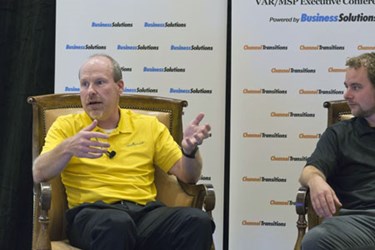Channel Transitions Midwest Panel: What You Need To Know About The MSP-Customer Relationship


The Channel Transitions Midwest VAR/MSP panel discussion — as well as questions from the audience — kept coming back to the challenge of developing a mutually beneficial relationship with managed services customers.
The panel at Channel Transitions Midwest, powered by Business Solutions on October 7 at the DoubleTree by Hilton Hotel Chicago-Oak Brook, featured Dale Walls, president of Corsica Technologies, a VAR providing managed services; Chris Rumpf, owner of Rumpf Computer Solutions, a point of sale (POS) VAR that now offers managed services; and David Wilkeson, owner of Tech Advisor and a former managed services provider (MSP).
Rumpf explains how the as-a-Service business model itself can help foster better relationships with your customers: “With break-fix, the question they ask themselves before they call is, ‘Do I want to spend the money to fix it or can I live with it?’ If they answer in the latter too many times, they start to hate you and go somewhere else. On managed services, they’re paying the fixed cost, so they call … When it’s fixed, they‘re happy.”
Walls points out, though, MSPs have to ensure the expectations to keep things running are reasonable. “Originally, I was all service,” Walls says, however, his company had to deal with inherited problems with legacy systems with poor backup. “We evolved to providing bundles that include antivirus and backup — it wasn’t a choice where the customer could check a box. If you’re hiring us and we’re going to be responsible for your IT infrastructure, we’re going to monitor it and we’re going to provide the backup.”
He adds, that although his company provides a few plan options, “We give them the option and let them convince themselves they ought to be on the standard plan.”
A Channel Transitions Midwest attendee asked several questions about service level agreements (SLAs). Wilkeson says SLAs should be very specific and you should know at the outset how you will measure and document that you kept to the terms of the agreement. He suggests writing SLAs around response times. “It’s difficult if it’s written around how fast you can fix things,” he comments.
The Business Solutions team commented that industry associations can provide guidance in this area. For example, the Retail Solutions Providers Association (RSPA) offers sample agreements to its members.
Wilkeson also says SLAs should be standard across your customer base. “If you change something for one customer, change it for everybody,” Wilkeson says. “It becomes impossible for your employees to manage.”
Rumpf says SLAs have definite benefits. “SLAs take care of a lot of the nonessential stuff. You aren’t getting bogged down by customer expectations … (SLAs) give you back your weekends.”
For more information on Channel Transitions VAR/MSP Executive Conferences that focus on helping VARs transitioning from break-fix to the as-a-Service business model, visit www.BSMinfo.com/go/ChannelTransitions.
Channel Transitions is sponsored by: Platinum Sponsors MAXfocus, Mercury, and Worldpay, Gold Sponsors F-Secure, RapidFire Tools, and CloudFounders, and Networking Sponsor Autotask, along with industry association partners CompTIA, The ASCII Group, and the Retail Solutions Providers Association (RSPA).
